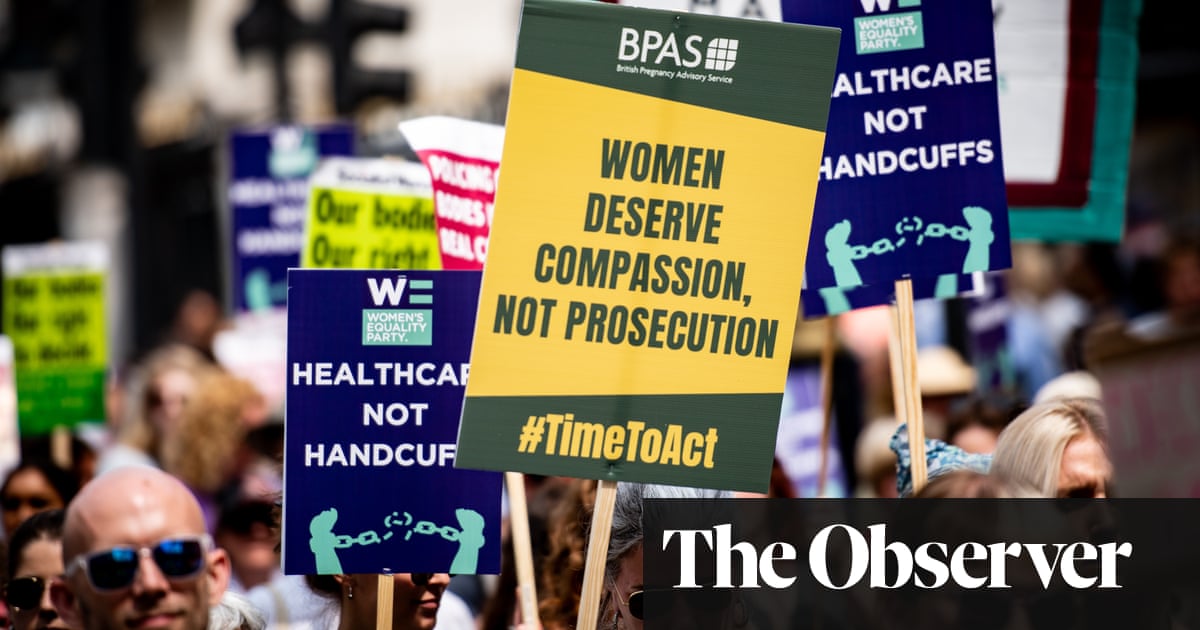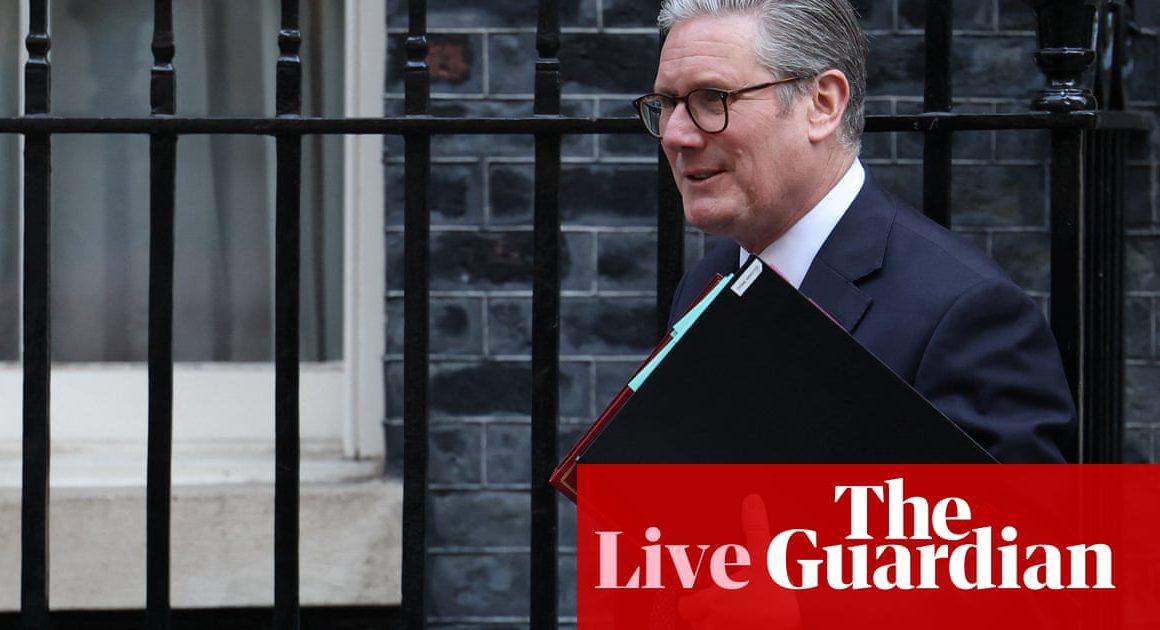Medical leaders are calling for reform of abortion laws in England and Wales after an “unprecedented” rise in women and girls being prosecuted for ending their own pregnancies.
More than 30 groups – including the British Medical Association, the Faculty of Public Health, the British Society of Abortion Care Providers and the royal colleges of GPs, nurses, psychiatrists, midwives and anaesthetists – issued a joint statement warning that the current legislation is causing “trauma and cruelty” and demanding “immediate action” to safeguard reproductive rights.
The intervention, led by the Royal College of Obstetricians and Gynaecologists (RCOG), comes after cases where women were prosecuted for illegal abortions under a Victorian-era law that remains in place today.
Six women have appeared in court over the past two years under the Offences against the Person Act. There had previously been only a handful of known convictions since the law was introduced in 1861. It is a criminal offence to have an abortion after 24 weeks or without approval from two doctors, carrying a maximum sentence of life imprisonment.
The groups, which represent about 800,000 healthcare professionals, are calling for a halt to prosecutions, saying abortion should be a healthcare issue, not a criminal one.
Backed by 20 legal experts and charities including Women’s Aid and Liberty, they suggest the change could be made as an amendment to the crime and policing bill, set to be introduced to parliament in the spring. They also call for a new bill to modernise abortion legislation, “so it can be managed through the same robust regulatory and quality monitoring processes as all other healthcare”.
“Women and girls are facing traumatic and prolonged criminal investigations following pregnancy loss and abortion in numbers never seen before,” they said. “We call on parliament as a matter of urgency to ensure women in England and Wales have the same protection as those in Northern Ireland by removing them from the threat of prosecution in relation to their own pregnancy.”
The call will put pressure on MPs amid rollbacks of abortion access in other countries, such as the US, and ramped up activity from anti-abortion activists in Britain. In the last parliament there were several attempts to restrict access, including an amendment to cut the legal limit from 24 weeks to 22. The Reform UK leader, Nigel Farage, has signalled his desire for MPs to look at cutting the limit.
Labour MPs including Jess Phillips and Diana Johnson – both now Home Office ministers – have been vocal about their support for modernising abortion laws. Before the election, Johnson tabled an amendment seeking to decriminalise it, backed by cross-party MPs including Phillips. However, some Labour figures urged caution about the bill, fearing it would embolden anti-abortion activists and lead to a rolling back of telemedicine, the remote provision of clinical services.
Dr Ranee Thakar, president of the RCOG, said: “The large majority of the public agree that it is not in the public interest to prosecute women for ending their own pregnancy.
“No woman should be forced to continue a pregnancy against her will. No woman should face the threat of jail, or the distress of an investigation or prosecution for ending a pregnancy, or for experiencing unexpected or unexplained pregnancy loss.”
Dr Andrew Green, chair of the British Medical Association’s ethics committee, said: “Criminalisation of abortion care belongs in a different era. It can discourage women from seeking safe healthcare when they need it, leading to unnecessary illness and suffering.”
Professor Kamila Hawthorne, chair of the Royal College of GPs, said: “The RCGP supports the decriminalisation of abortion and believes a change in the law is long overdue. It does not make sense that women can be prosecuted due to antiquated laws that were created before women were even allowed to vote.”
Campaigners say the proposed changes would not lead to deregulation of abortion. But the approach would stop women being prosecuted for ending their own pregnancies – bringing the law into line with countries including Northern Ireland, Ireland, Canada, Australia, New Zealand and France, where it is decriminalised.
While abortion is accessible and prosecutions are uncommon, it is still a criminal offence in England and Wales to procure an abortion under the 1861 law. There are exemptions under the 1967 Abortion Act, which permits abortion when two doctors agree continuing the pregnancy would be risky for the women’s physical or mental health. But the old law was never repealed.
The Observer previously revealed police have launched dozens of investigations into suspected breaches of the law in the past decade, including cases where women bought abortion pills online and drank herbal remedies without medical supervision.
In one case in 2021, a 15-year-old girl who had an unexplained early stillbirth was subjected to a year-long investigation that saw her texts and search history examined, according to records released under freedom of information laws. The case was dropped after a coroner concluded natural causes ended the pregnancy.
In another case, in Norfolk, a woman was hospitalised after swallowing eight misoprostol tablets – used with mifepristone to induce abortion – which had not been obtained through a doctor. She was thought to be 26 weeks pregnant, two weeks past the legal limit.
In the 10 years to April 2022, police in England and Wales recorded at least 67 cases of procuring an illegal abortion, the FoI data shows. In most the women were not charged because it was not considered to be in the public interest. But in some recent cases, women have faced prosecution.
In December, Sophie Harvey, 25, was given a community order after admitting to conspiring with her partner to buy abortion pills to end her pregnancy when she was 19. The case took six years.
In 2023, Carla Foster, 44, was jailed after admitting ending her pregnancy beyond the time limit during a coronavirus lockdown. Her 28-month sentence was later reduced to 14 months and suspended, with judges saying her case called for “compassion, not punishment”. In January 2024, Bethany Cox, 22, was found not guilty of an illegal at-home abortion after a three-year investigation. Prosecutors dropped the case due to “evidential difficulties”.
The reason for the apparent rise in prosecutions is not clear. But Prof Sally Sheldon, an expert in abortion law at Bristol university, said greater awareness of medical abortions after the launch of telemedicine services had likely led to heightened vigilance among healthcare professionals. Reporting on illegal abortion cases had likely also led to greater awareness of the law, she said. “Any time we have one of these cases there is a massive amount of publicity, so that can fuel it,” she said.
Campaigners say the impact of investigations can be “profound”. In several cases, women have had their children removed from their family and contact banned or severely restricted. It is common for mobile phones and computers to be seized.
“Even if charges are not brought, the impact of the investigation causes life-changing harm to women and their families,” said Dr Jonathan Lord, an NHS gynaecologist and co-chair of the RCOG abortion taskforce. “Many cases do not proceed to a prosecution, but it can take years before the case is dropped.”
Shila Keshvari, a criminal defence lawyer with expertise in abortion law, said “young teenagers” and abuse victims were among those investigated over alleged illegal terminations. “Many have gone into hospital for a stillbirth and before they know it, the police have turned up to arrest them. The impact is long-term mental health trauma,” she said.
The government did not comment on the calls for new legislation. A spokesperson said abortion was an “extremely sensitive issue” with “strongly held views on all sides of the discussion”. “That is why, by longstanding convention, any change to the law would be a matter of conscience for parliamentarians rather than the government.” It said prosecutions were a matter for the CPS.
A CPS spokesperson said cases, though rare, were often “complex and traumatic” and that prosecutors considered each one carefully. It said prosecution numbers reflected the cases referred to it and that court backlogs meant some cases charged pre-pandemic had only recently been heard.
The National Police Chiefs’ Council said investigations were only initiated where there was “credible information to suggest criminal activity … often as a result of concerns raised from medical professionals”, and were “always treated … with sensitivity and compassion”.
Labour MP Stella Creasy, a vocal campaigner on reproductive rights, said: “We cannot ignore the fact that hundreds of women are still being investigated in often the most gruelling circumstances, having had a late-term miscarriage, or not even knowing they were pregnant at all. Instead of a counsellor, they get a police officer visiting them.”
Dr Janet Barter, president of the Faculty of Sexual and Reproductive Health, said: “A change to the legislation is long overdue.”












